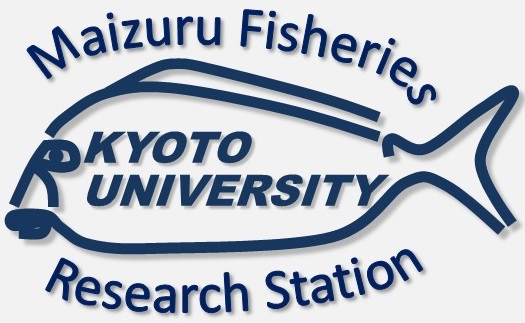3. Students
Hunter Harter Godfrey
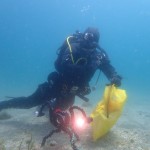 Affiliation: Doctoral candidate, Division of Applied Biosciences, Graduate School of Agriculture
Affiliation: Doctoral candidate, Division of Applied Biosciences, Graduate School of Agriculture
Contact: hunter.godfrey.46s*st.kyoto-u.ac.jp (replace * by @)
Specialty: artificial reef ecology, fisheries management, fish intraspecific behavior
Hobby: scuba diving, underwater photography/video, video editing
Research theme:
1. Efficacy and implementation of artificial reefs in fisheries management
I intend to examine the efficacy and ramifications of artificial reefs (ARs) in a fisheries management context. Japan has a long history of using ARs and has developed some of the most robust technologies in this field. Do certain species benefit from ARs or does it simply attract species from other sources? I seek to study the ARs in relation to the snow crab and abalone fisheries in Kyoto Prefecture through the use of new environmental DNA advancements.
2. Agonistic behavior in species of benthic fish
I have previously documented benthic fish agonistic behavior while scuba diving with a video camera. This has led to my curiosity to document more aggressive or peculiar fish behavior in the wild. What factors drive territoriality and aggressive behavior? How does it differ from species to species? I’m studying intra and inter-specific interactions between members of the family Gobiidae and Blenniidae in situ.
Career and Publications:
Observations of agonistic behavior between two island kelpfish, Alloclinus holderi (Lauderbach, 1907) (Labrisomidae), at Anacapa Island, California.
Link to the publication
Observations of Agonistic Behavior between Two Male Gobies Acentrogobius virgatulus (Jordan & Snyder, 1901), in Maizuru Bay, Kyoto Prefecture, Japan
Link to the publication
Personal Page:
https://maverickdiving.blogspot.com
SHI Shoju
 Affiliation: Doctoral candidate, Division of Applied Biosciences, Graduate School of Agriculture
Affiliation: Doctoral candidate, Division of Applied Biosciences, Graduate School of Agriculture
Contact: shi.shoju.27n*st.kyoto-u.ac.jp (replace * by @)
Specialty: marine ecology
Hobby: keeping animals (ranging from bugs to reptiles), collecting insects, drawing, daydreaming
Research theme: Unraveling the role of spiny lobsters in the shallow marine ecosystem
Currently, shallow sea floors in Japan are confronted by “barrens”, a circumstance where seaweed community in a landscape debilitates and diminishes. This issue goes beyond its unaesthetic nature: the overlying ecosystem dependent on these seaweed is in peril. Several factors are accountable for this phenomenon, but one principle culprit is the augmentation of herbivorous animals. Hence, I contend to examine the ability of potential predators (namely spiny lobsters) to prey on these animals, and further scrutinize the conditions that hamper or promote these activities.
Career and Publications:
2022 Graduated from International Christian University, College of Liberal Arts
2022 Entered Kyoto University Graduate school of Agriculture, Division of Applied Biosciences
SENDA Tetsuro
 Affiliation: Doctoral candidate, Division of Applied Biosciences, Graduate School of Agriculture
Affiliation: Doctoral candidate, Division of Applied Biosciences, Graduate School of Agriculture
Contact: tetsuro.senda.52u*st.kyoto-u.ac.jp (replace * by @)
Specialty: fish taxonomy, fish systematics
Hobby: cycling, computer programming, making fish specimens
Research theme: Systematic taxonomy and population genetics of fishes
Career and Publications:
2014 Graduated from Tonami high school
2018 Bachelor of Faculty of Fisheries, Hokkaido University
2020 Master of Faculty of Fisheries, Graduate School of Fisheries Sciences, Hokkaido University
2021-2022, Research support staff, National Research Institute of Far Seas Fisheries, Japan Fisheries Research and Education Agency
2023 Reserch student, Maizuru Fisheries Research Station, Field Science Education and Research Center, Kyoto University
KUROSAWA Takumi
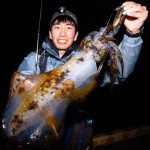 Affiliation: Master’s candidate, Division of Applied Biosciences, Graduate School of Agriculture
Affiliation: Master’s candidate, Division of Applied Biosciences, Graduate School of Agriculture
Contact: kurosawa.takumi.48x*st.kyoto-u.ac.jp (replace * by @)
Specialty: fish ethology
Hobby: fishing, watching sports
Research theme: Anti-predator behavior in squids
Cephalopods, including squids, are known to exhibit high learning ability, as they have well-developed sensory organs and nervous systems, such as lens eyes similar to those of humans and large brains. Another characteristic of cephalopods is that they can change their body color and shape in various ways. I plan to test how squids (bigfin reef squid and golden cuttlefish) respond to various types of predatory stimuli, and to reveal their anti-predator strategy. Hopefully my fishing skill will be of use this study.
Career and Publications:
2022 Graduated from Kyoto University, Faculty of Agriculture
2022 Entered Kyoto University Graduate school of Agriculture, Division of Applied Biosciences
LU Hongtao
 Affiliation: Master’s candidate, Division of Applied Biosciences, Graduate School of Agriculture
Affiliation: Master’s candidate, Division of Applied Biosciences, Graduate School of Agriculture
Contact: lu.hongtao.74h*st.kyoto-u.ac.jp (replace * by @)
Specialty: fish ethology
Hobby: behavioral observation, sightseeing, watching anime
Research theme: Behavioral rhythm of Japanese sea bass
Career and Publications:
2023.6 Graduated from Xiamen University, College of Ocean and Earth Science
2023.10 Entered Kyoto University Field Research Center as a researching student
2024.4 Entered Kyoto University Graduate School of Agriculture, Division of Applied Biosciences
TAKENO Keisuke
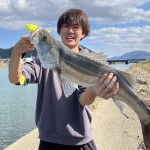 Affiliation: Master’s candidate, Division of Applied Biosciences, Graduate School of Agriculture
Affiliation: Master’s candidate, Division of Applied Biosciences, Graduate School of Agriculture
Contact: takeno.keisuke.55e*st.kyoto-u.ac.jp (replace * by @)
Specialty: Ecology of burrowing crustaceans
Hobby: fishing, watching films
Research theme: Development and field application of the measurement method of crustacean’s water pumping through their burrows
In tidal flats, bethic animals make burrows, which contribute to ecological functions of tidal flats, such as water purification and biogeochemical cycle. Specifically, crsutacean’s water pumping through their burrows is considered to be important. As there is no quantitative measurement method of such water pumping, I aim to develop it.
Career and Publications:
TAJIMA Aaron
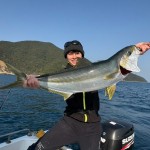 Affiliation: Master’s candidate, Division of Applied Biosciences, Graduate School of Agriculture
Affiliation: Master’s candidate, Division of Applied Biosciences, Graduate School of Agriculture
Contact: tajima.aaron.63h*st.kyoto-u.ac.jp (replace * by @)
Specialty: fish ethology
Hobby: Fishing, Animal observation (especially Japanese macaques)
Research theme: The effects of environmental factors on feeding activity in fish
I aim to explore how fish adjust the intensity of their feeding behavior in response to changing environmental conditions.
Career and Publications
2025 Graduated from Kyoto University, Faculty of Science
2025 Entered Kyoto University Graduate school of Agriculture, Division of Applied Biosciences
KODERA Ami
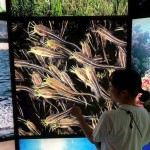 Affiliation: Master’s candidate, Division of Applied Biosciences, Graduate School of Agriculture
Affiliation: Master’s candidate, Division of Applied Biosciences, Graduate School of Agriculture
Contact: kodera.ami.42r*st.kyoto-u.ac.jp (replace * by @)
Specialty: fish ethology
Hobby: watching creatures, sampling sea slugs, bird watching, underwater photography, enjoying theaters, cinemas, animation, and music, traveling
Research theme: Ecology and adaptive significance of fish schools
Fish schools can be regarded as a prototype of socialization in vertebrates. Schooling behaviors have contributed to the prosperity of a wide variety of animals including fish. In this context, fish schools will be an ideal research object for a better understanding of animal ethology and ecology. In this study, I focus on Japanese eel catfish (Plotosus japonicus) that maintains schools using aggregation pheromone. The cognitive ability of an individual to others within and outside the school will be studied in relation to learning.
Career and Publications
2025 Graduated from Kindai University, Faculty of Agriculture
2025 Entered Kyoto University Graduate school of Agriculture, Division of Applied Biosciences
